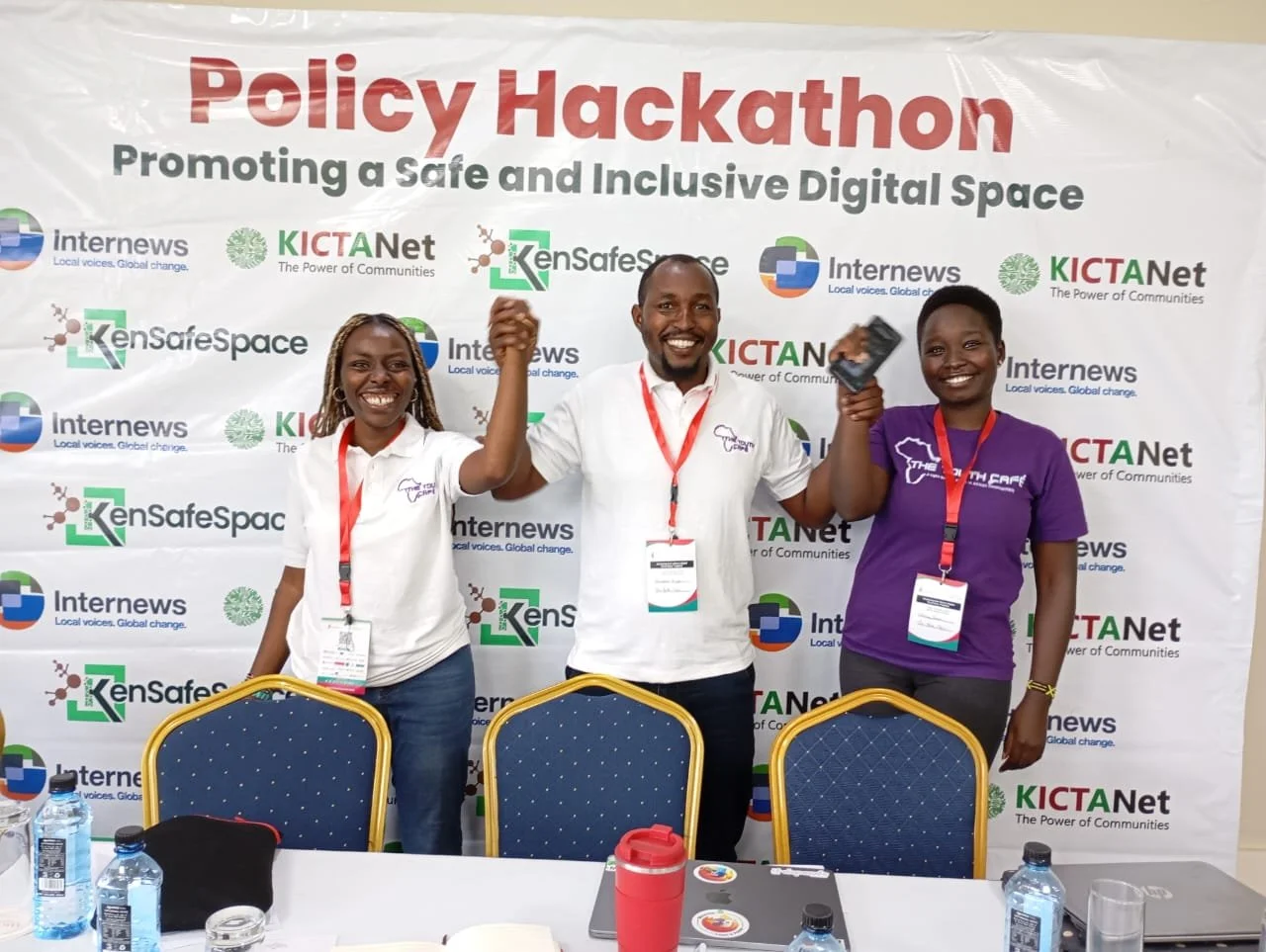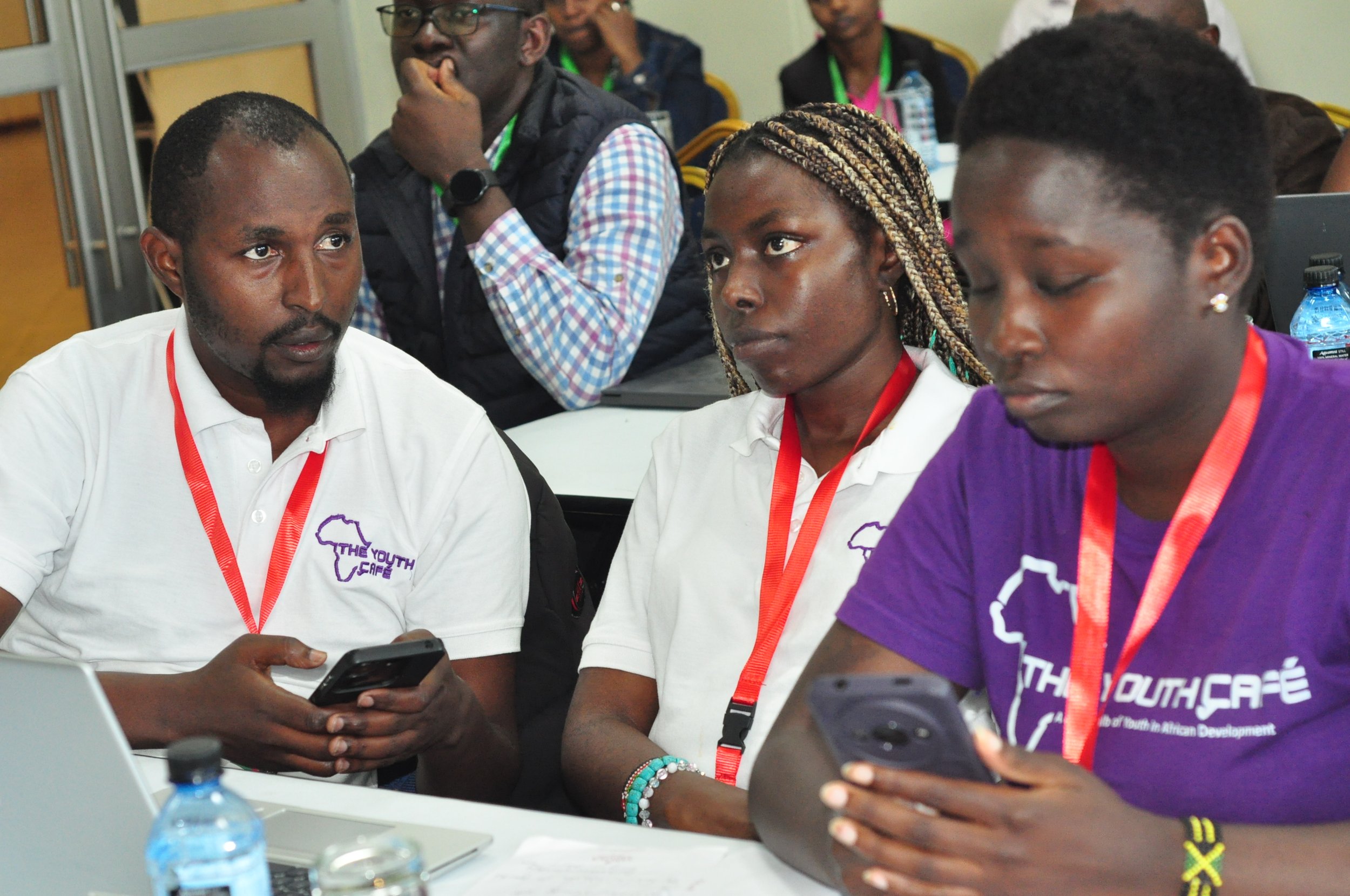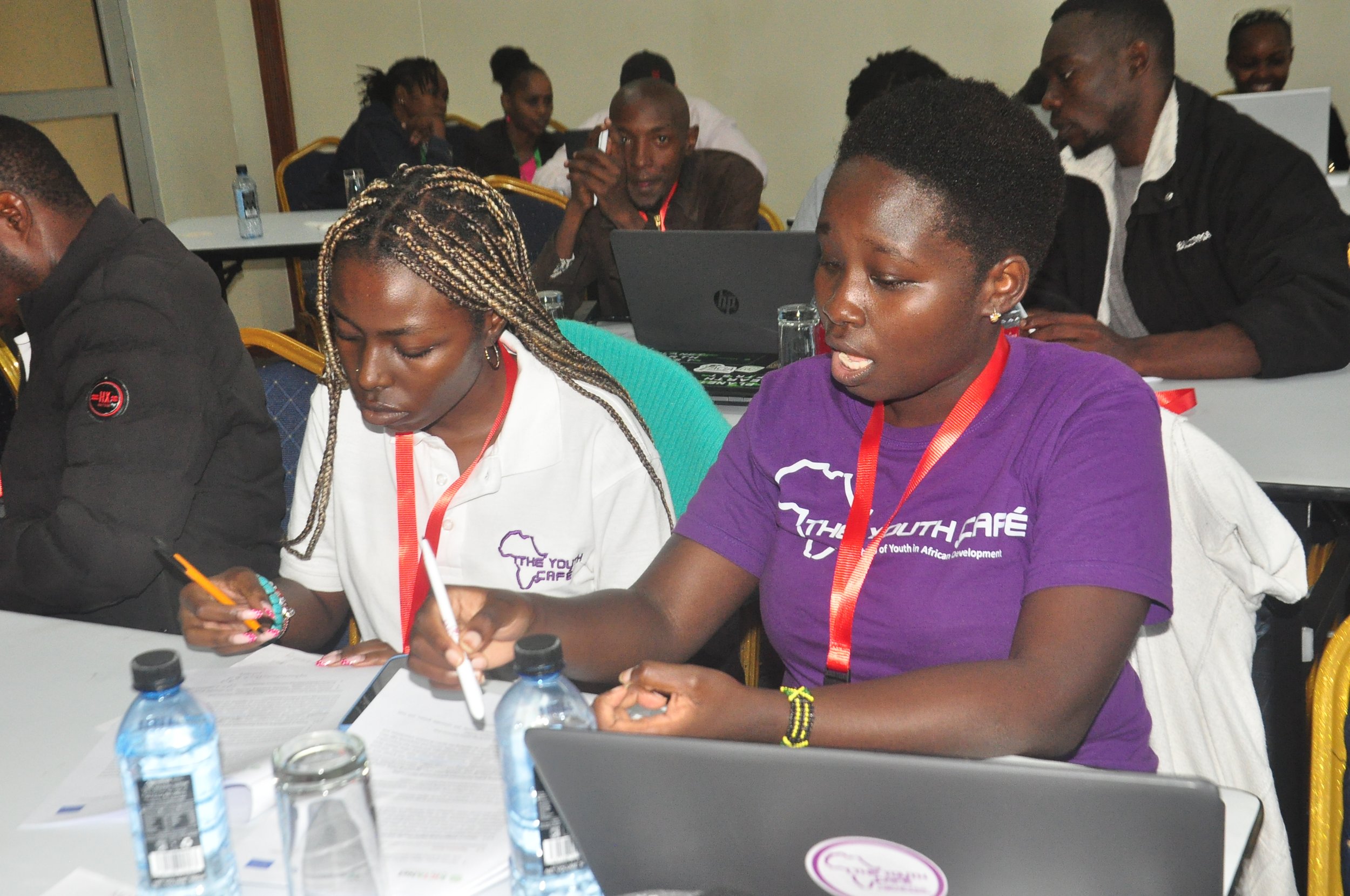TYC Hackathon team of Mumbiko Kingori, Shirley Jemeli, and Cidney Njeri.
Introduction and Background
Human rights organisations (HROs) over the years have been at the forefront of championing and advocating for respect of human rights and their associated freedoms. Working either as civil societies (CSOs) or community-based organisations (CBOs) their works have impacted positive changes in societies and communities within which they are based.
However, with the increased adoption of the internet, digitalisation and digitisation of societal interactions, various challenges have emerged including the marginalisation of some community members within the digital space. These include the rise of tech-facilitated gender-based violence (TFGBV), specifically for women, poses significant challenges to the HROs’ works in protecting citizens' digital rights and promoting the inclusion of women in the digital spaces.
This series of policy hackathons aims to empower Kenyan human rights organisations, by amplifying their capacity and influence to advocate for and ensure a democratic, safe, and inclusive digital environment. This will be achieved through innovative strategies, collaboration, and building policy proposals or design prototypes with a specific focus on enhancing online safety for Kenyan women and preventing technology-facilitated gender-based violence.
KICTANet has been at the forefront of promoting digital rights and human-rights centric ICT policies and legislation in Kenya, including through various initiatives focusing on policy advocacy, multi stakeholder engagement, capacity building, coalition building and research to create a more safe, open and inclusive digital ecosystem. In furtherance of its mission, KICTANet is implementing the Kenya Safe and Inclusive Digital Space (KenSafeSpace) Action project supported by the European Union, in partnership with Internews and Internet Without Borders (IWB).
The initiative aims to amplify Kenyan human rights organisations’ voice, capacity, and influence to advocate for a democratic, safe, and inclusive digital environment. The consortium also collaborates with organisations such as the Bloggers Association of Kenya (BAKE), Tribeless Youth, Mzalendo Trust, and Watoto Watch Network (WWN) to support advocacy and research activities.
The Youth Cafe’s winning innovative solution is #CivicSafeKE: “Cyber Rights Campus Connect," is a youth-led initiative to empower university students with clear, actionable knowledge of the CMCA 2018. We'll conduct on-site, live interactive podcasts at three institutions in Kiambu County (Kenyatta University, Jomo Kenyatta University of Agriculture and Technology, and Kiambu Institute of Science and Technology), one per month.
Each podcast targets 100-150 on-site students and aims to reach 1,000 online participants via live streaming. Discussions will focus on CMCA Sections 27 and 37, using case studies and clarifying legal implications. We'll gather student feedback and policy recommendations for our final brief. Key stakeholders, including regulators (CAK/ODPC), law enforcement (DCI cybercrime unit), lawmakers (Parliamentary Committee on Communication, Information and Innovation), and legal experts, will be invited to provide comprehensive guidance and discuss reporting mechanisms and legal amendments.
This is in direct response to the problem of misinterpretation and lack of knowledge of cyber crime
legal frameworks. This vital participation is under threat. We're seeing a surge in digital harassment , cyberbullying, and non consensual sharing of intimate images.
As a result this misinterpretation of the three topics disproportionately affects young women, minority and vulnerable groups . There is misinterpretation of cyber crime laws by the youth especially the computer misuse and cyber crime act 2018 which most young people least understand the provisions but more so the repercussions.
In Kenya's vibrant digital landscape, young people are increasingly using online platforms for crucial civic engagement – from elections to social justice movements We aim to address cyberbullying and harassment (section 27) and non-consensual sharing of intimate images (section 37).
1.2 The Policy Hackathon
The aim is to develop innovative policy responses to promote a democratic, safe, and inclusive digital environment. Additionally, specific objectives include:
1. Strengthening collaboration among local civil society organisations (CSOs), community-based organizations (CBOs), and human rights advocates to co-create policy proposals and design prototypes addressing policy challenges in the digital sphere.
2. Review effectiveness of policy, legal and regulatory frameworks alignment with the Constitution and international human rights standards.
3. Develop model digital policies, codes of conduct, and guidelines that promote democratic, safe, and inclusive digital spaces in Kenya.
1.3 Thematic Areas
The hackathon participants are required to select one of the following thematic areas:
1.3.1 Theme 1: Safeguarding Digital Identity and Data Protection
The increasing digitisation of services and the growth of local digital public infrastructure have led to the massive collection of personal data, raising concerns about privacy and the security of personal information. Data is collected and processed by state and non-state actors for communication, entertainment, e-commerce and access to essential government services, including health, elections, education and citizen services. However, many individuals are unaware of the purpose or use of their data. Likewise, the increased use of the internet and emerging technologies such as artificial intelligence and social media, introduce new challenges to digital rights, including privacy and data protection.
This theme will require participants to explore and design policy solutions that:
Enhance and protect individuals' privacy, digital identities, personal data, security and user control over their personal information.
Promote innovation while safeguarding individual privacy rights from breaches.
Ensure principles of data protection, including transparency and accountability.
Promote effective remedial mechanisms and redress for violations.
1.3.2 Theme 2: Combating Online Harassment and Promoting Digital Safety
In today's digital landscape, online harms manifest in many ways, permeating nearly every aspect of society. They include disinformation, hate speech, cyberbullying, cyberattacks, data breaches, harassment, cyberstalking, non-consensual sharing of intimate images, which have become prevalent on digital platforms, and disproportionately endanger vulnerable individuals and groups such as children, women, and minority individuals.
Moreover, online harms have severe real-world consequences, impacting mental health, social relationships, and even physical safety. Despite these trends, online platforms have not effectively addressed the challenges, and neither has Kenya’s policy framework been effective in protecting victims. In Kenya, TFGBV mirrors and compounds high rates and existing patterns of gender-based violence by digitising the tactics of control, intimidation, and harm historically used in patriarchal systems.
This theme will require participants to explore and design policies solutions that:
Address tech-facilitated gender-based violence (TFGBV).
Promote online safety, including protecting minority and vulnerable groups, and hold perpetrators accountable.
Promote effective reporting and response mechanisms.
Promote ethical and responsible use of online platforms.
1.3.3 Theme 3: Enhancing Content Moderation and Platform Accountability
Digital platforms play a significant role in shaping public discourse, but they often struggle to balance freedom of expression with the need to prevent harmful content. There is a growing debate about the role of platforms in moderating content, including using AI, and the need for greater transparency and accountability.
In Kenya, the spread of misinformation, disinformation and hate speech online have had serious consequences, including eroding public trust in key democratic and media institutions, increasing polarisation, heightening anxiety, distorting perceptions, reinforcing pre-existing biases, inciting violence, and undermining democracy. While there are various efforts to regulate online platforms globally, Kenya’s policy and legal frameworks continue to fall short in holding platforms accountable, and ensuring content moderation systems are responsive to the unique needs and priorities of our community.
This theme will require participants to explore and design policy solutions that:
Address the challenges of content moderation on digital platforms, including combating harmful content such as misinformation, disinformation, hate speech, and violent extremism.
Promote transparency, accountability, and fairness in content moderation practices.
Development of clear and consistent content moderation policies, including the use of automated moderation systems, local context considerations, and human oversight in moderation.
Provision of effective mechanisms for content appeals and redress.
1.4 Expected Outcomes
By the end of the hackathon, we anticipate the following:
1. Development of comprehensive model policies, codes of conduct, and guidelines.
2. Strengthened partnerships among CSOs, CBOs, human rights advocates, and policymakers, fostering a collaborative approach to digital policy development.
3. Presentation of developed policies to legislators and stakeholders, advocating for their adoption in legal and regulatory reforms.
1.5 Target Audience and Participants
The targeted participants for the policy hackathon are representatives from Community-Based Organisations (CBOs) and Civil Society Organisations (CSOs), particularly those working at the grassroots level on digital rights, online safety, and combating technology-facilitated gender-based violence (TFGBV). The hackathon will comprise 10 teams in total. Each team will consist of three participants, ideally representing diverse organizations to ensure varied perspectives and expertise.
1.6 Format
To attract good and fair participation of all the targeted organisations in the targeted counties, a call for applications will be put ou,t and the CSOs and CBOs that work on the thematic areas of digital rights can apply. The applications will be reviewed by Internews and KICTANET and shortlisted applicants invited for the hackathons. The hackathon will comprise 10 teams in total. Each team will consist of five team members. The teams will be given a time frame to work on developing model tech and digital policies, codes of conduct/guidelines on online women's safety. Judges will be able to review the hackathon products, and top 3 teams will be selected, and they will win seed funding.
What's next for the winners a er the hackathon?
Internews and KICTANet will incubate the hackathon winners by making follow-ups after the event to see that policy recommendations or coded prototypes have been presented to legislators and other stakeholders, to be considered for legal or regulatory changes.
1.7 About the Organizers
KICTANet is a multistakeholder think tank for ICT policy and regulation whose guiding philosophy encourages synergies for ICT policy-related activities and initiatives. The network is a catalyst for reform in the ICT sector and is guided by four pillars: policy advocacy, stakeholder engagement, capacity building, and research. The network provides mechanisms and a framework for continuing cooperation and collaboration in ICT matters among industry, the technical community, academia, media, development partners, and government.
Internews is a media support nonprofit working in 100+ countries. It trains journalists, advances internet freedom, and helps media outlets become financially sustainable, so that everyone has trustworthy information to make informed decisions and hold power to account.








